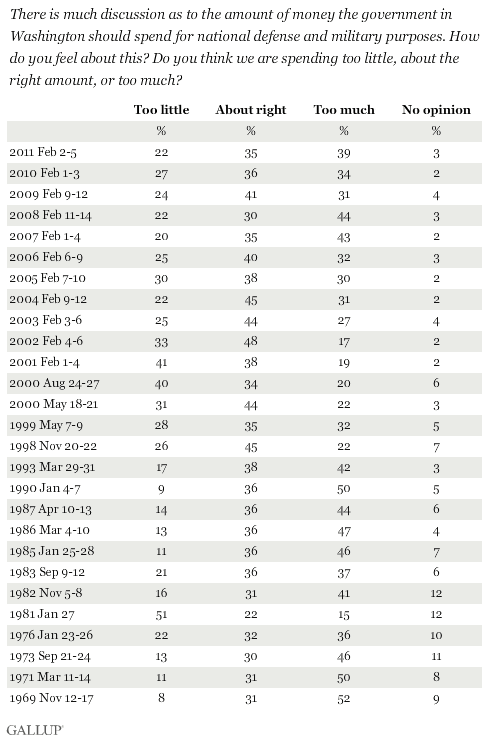PRINCETON, NJ -- At a time when the Obama administration and Secretary of Defense Robert Gates have called for a $78 billion reduction in defense spending over the next five years, Americans lean toward the position that the government is spending too much on national defense rather than too little. Overall, 39% of Americans say the U.S. spends too much on defense, 22% say it spends too little, and 35% say defense spending is about right.

These results are based on Gallup's annual World Affairs poll conducted Feb. 2-5, prior to Monday's release of the Obama administration's proposed 2012 budget.
Given that Americans' opinions on defense spending are divided, there is no strong mandate to either cut or increase spending. With 57% of Americans saying defense spending currently is either about right or too little, the proposed long-term cuts in defense spending could be met with more opposition than support.
The current tilt toward the perception of too much defense spending, rather than too little, has generally been the norm over the 42-year Gallup history of asking this question. Notable exceptions occurred at the beginning of the Reagan administration in 1981, and in the early 2000s, both before and after the Sept. 11, 2001, terrorist attacks. (Full trends on this question are on page 2.)
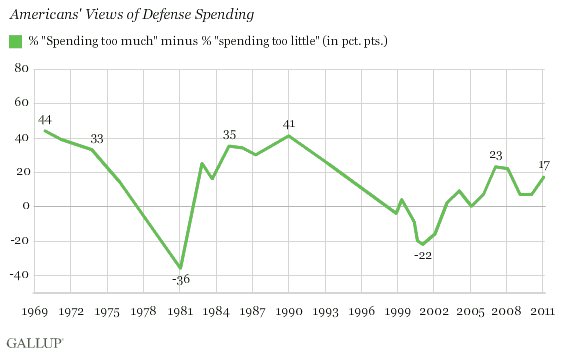
Most Americans Believe National Defense Is About Right or Not Strong Enough
Despite the plurality of Americans' perception that the U.S. spends too much on national defense, an even larger 50% say the strength of U.S. national defense is about right at present, and another 37% say it is not strong enough. Relatively few Americans believe the nation's defense is stronger than it needs to be.
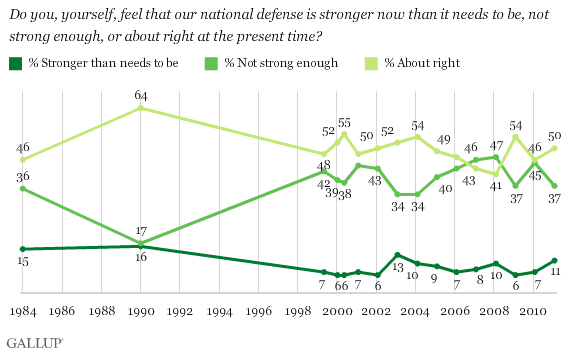
Few Americans have said national defense is stronger than it needs to be at any point since Gallup first asked this question in 1984, perhaps explaining the persistent political resistance in Washington to cutting defense spending.
Republicans Most in Favor of More Defense
Gates, having served as secretary of defense in the Republican administration of George W. Bush as well as the current Obama administration, has bipartisan credibility as he makes recommendations on defense cutbacks. Among all Americans, however, Republicans are most likely to say the government spends too little on national defense and to say the current national defense is not strong enough. Democrats, on the other hand, think the U.S. spends too much on the military and that the nation's defense is about right, with independents' attitudes somewhere in the middle.
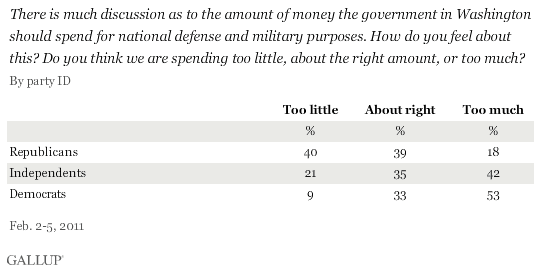
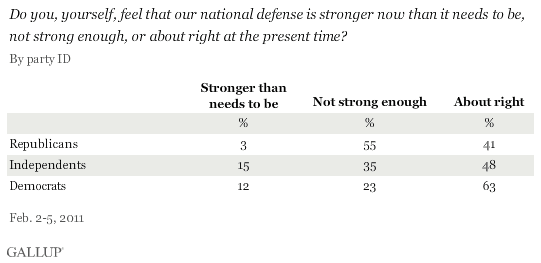
These views are reflected to a large degree in Democratic and Republican leaders' proposals for reining in federal government spending. Republicans' plans generally spare the military and defense from any cutbacks, while Democratic proposals seek to make cuts in the defense budget.
Implications
Leaders of both political parties in Washington currently agree on the need for significant cutbacks in government spending. Defense spending is one of the logical focal points for these efforts, since, along with entitlement programs and servicing the national debt, defense is one of the largest categories of federal spending.
The Obama administration has included $78 billion in defense cuts over time in its proposed defense budget released on Monday, although these cuts are not as large on a percentage basis as those proposed for other departments and agencies of the government.
The future of these proposed cuts is likely to be a major topic of debate in Washington in the weeks and months to come.
Americans do not provide government leaders with clear-cut direction on making defense cuts. They currently tilt toward the view that there is too much spending on defense, and that figure has increased slightly, from 31% to 39%, since 2009. However, almost as many Americans say current defense spending is about right, and combined with the 22% saying it is too little, the majority of Americans would theoretically oppose defense cuts.
Additionally, there are marked partisan divides on this issue, with rank-and-file Republicans across the country less in favor of cutting back defense spending than are Democrats. This puts the Republican leadership in Washington in what could be a difficult position. These GOP leaders have been most vocal in calling for severe cuts in government spending. Yet they represent a constituency that is less in favor of cutting back one of the largest categories of spending than are either independents or Democrats. Some Republican leaders have so far reflected the views of their base and backed off from calling for deep defense cuts, while others have suggested that defense cuts may be necessary.
Survey Methods
Results for this Gallup poll are based on telephone interviews conducted Feb. 2-5, 2011, with a random sample of 1,015 adults, aged 18 and older, living in the continental U.S., selected using random-digit-dial sampling.
For results based on the total sample of national adults, one can say with 95% confidence that the maximum margin of sampling error is ±4 percentage points.
Interviews are conducted with respondents on landline telephones (for respondents with a landline telephone) and cellular phones (for respondents who are cell phone-only). Each sample includes a minimum quota of 150 cell phone-only respondents and 850 landline respondents, with additional minimum quotas among landline respondents for gender within region. Landline respondents are chosen at random within each household on the basis of which member had the most recent birthday.
Samples are weighted by gender, age, race, education, region, and phone lines. Demographic weighting targets are based on the March 2010 Current Population Survey figures for the aged 18 and older non-institutionalized population living in continental U.S. telephone households. All reported margins of sampling error include the computed design effects for weighting and sample design.
In addition to sampling error, question wording and practical difficulties in conducting surveys can introduce error or bias into the findings of public opinion polls.
View methodology, full question results, and trend data.
For more details on Gallup's polling methodology, visit www.gallup.com.
